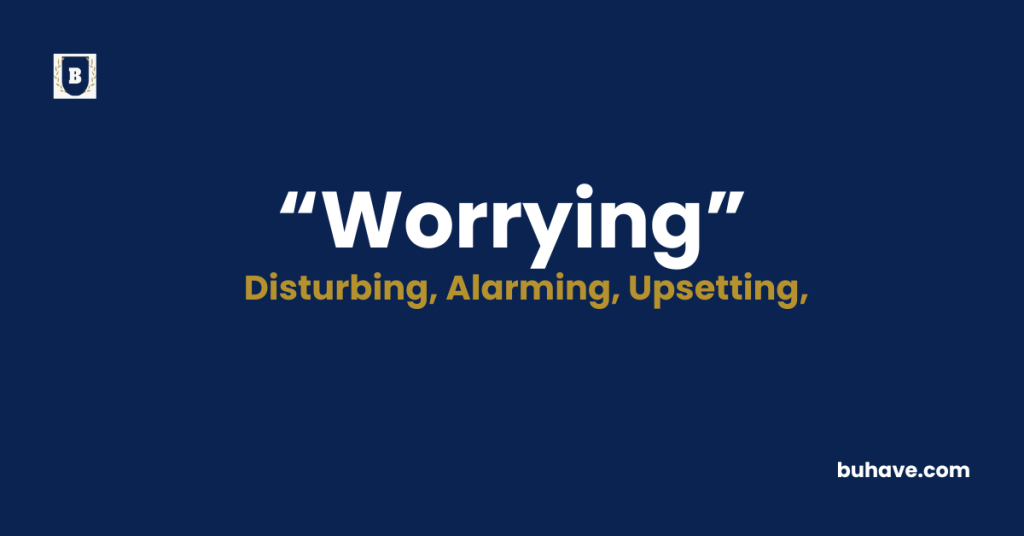The word ‘Worrying’ (Adjective) describes something that causes anxiety, unease, or concern, especially about potential problems or negative outcomes. In this guide, you’ll learn the full definition, synonyms, antonyms, etymology, and real-life examples of how to use ‘Worrying’ correctly in sentences.
Worrying Explained in Depth
A complete and detailed guide to the word Worrying including meaning, definition, examples, etymology, synonyms, and antonyms.
Meanings of Worrying
‘Worrying’ refers to anything that makes a person feel uncertain, tense, or afraid about the future. It highlights something that may seem threatening, unsafe, or problematic, often stirring mental or emotional distress. For instance, a worrying trend in climate data or a worrying medical symptom signals the need for attention or concern.
This word is used to express the emotional effect of a situation that could potentially lead to trouble or harm, even if nothing negative has yet happened.
Definition
Worrying means causing someone to feel anxious, uneasy, or troubled due to perceived risk, danger, or unfavorable possibilities. It usually applies to situations, news, or developments that are uncertain or disturbing. The word does not imply a guaranteed bad outcome but signals enough uncertainty or concern to prompt emotional discomfort or cautious attention.
Etymology
The word “worrying” derives from the verb “worry,” which originally came from the Old English word wyrgan, meaning “to strangle.” Over centuries, the meaning shifted from physical constraint to mental anxiety or distress. By the 19th century, “worrying” came to represent the act or result of causing concern or uneasiness.
Today, it emphasizes emotional tension caused by uncertainty, rather than physical aggression.
Example Sentences
- The doctor’s expression was worrying, and I knew something was wrong.
- There’s a worrying lack of progress on the project.
- It’s worrying how little attention is being paid to climate issues.
- Her silence was more worrying than any words she could have said.
- This trend in social behavior is particularly worrying to researchers.
Worrying Synonyms
- Concerning
- Alarming
- Disturbing
- Upsetting
- Unnerving
- Troubling
- Disconcerting
- Frightening
- Ominous
- Disquieting
Worrying Antonyms
- Reassuring
- Comforting
- Encouraging
- Calming
- Relaxing
- Soothing
- Promising
- Inspiring
- Hopeful
- Confident
FAQs about Worrying
Here are some frequently asked questions (FAQs) about the word “Worrying”
1. What does “worrying” mean in a sentence?
It refers to something that causes feelings of anxiety or concern. Example: “The lack of information was worrying.”
2. Is “worrying” always negative?
Yes, it typically indicates negative or uneasy emotions, although it can range from mild concern to serious alarm.
3. Can people be described as “worrying”?
Generally, “worrying” describes situations or things, not people. A person may be “worried,” but their behavior or statements may be “worrying.”
4. Is “worrying” stronger than “concerning”?
Yes. “Worrying” suggests a deeper emotional impact or more serious anxiety than “concerning,” which is often milder.
5. How is “worrying” used in formal writing?
It’s commonly used in news, research, and reports to indicate troubling trends, risks, or developments.
6. Can worrying be productive?
In some cases, it can prompt action or caution, but excessive worrying is usually emotionally draining and unhelpful.
7. What’s the difference between “worried” and “worrying”?
“Worried” is a feeling; “worrying” is something that causes that feeling.

















